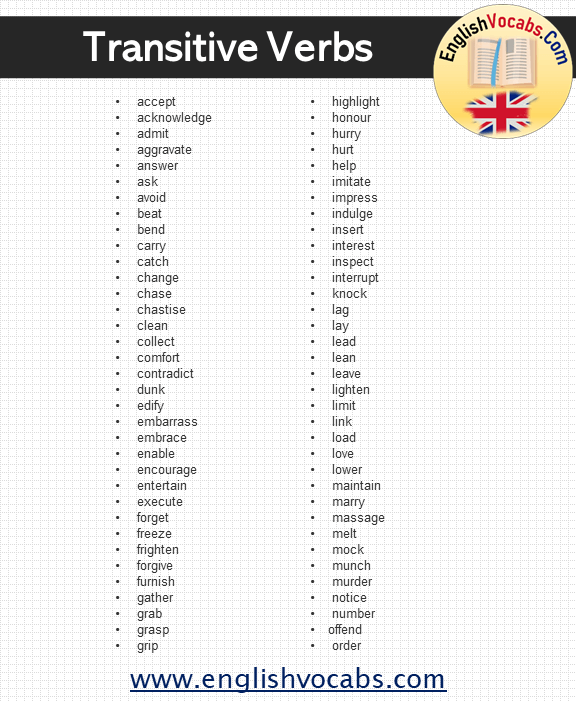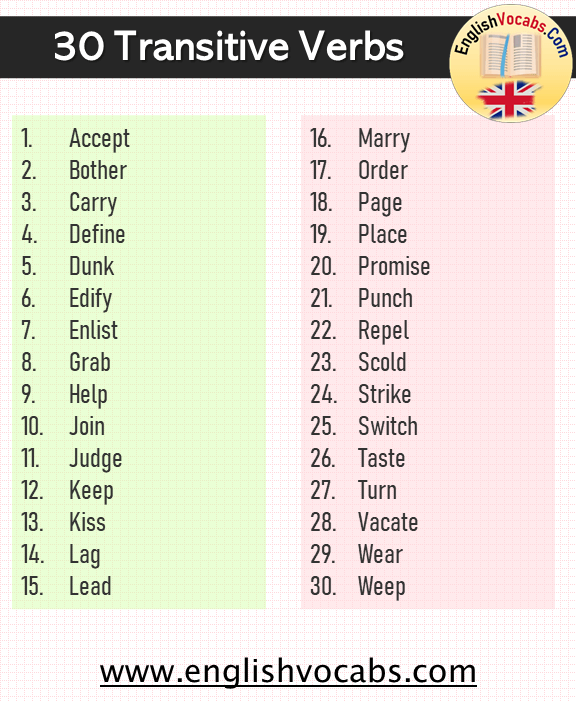Transitive Verb and Intransitive Verbs Examples

Table of Contents
Use of Verbs and Verb Types
Words that describe a movement, a situation, or an event in a sentence are called “verbs”. In terms of English grammar, verbs should also be used correctly in a sentence. Verb types and the use of these varieties are required for a correct sentence structure and a correct meaning. It is possible to see that verbs are grouped under two general headings in grammar. The verbs are more detailed in these 2 main headings.
Non-Stative Verbs or Action Verbs
The verbs under this title directly describe what the subject is busy with at that moment. In particular, these verbs contain visible, in other words, concrete action and situations. The use of such verbs is known as the Simple Present Tense and the Present Continuous Tense.
- My mother is cleaning the house now.
- She plays sports every morning.
- I’m doing dinner tonight.
- He is holding a large package in his hand.
Transitive Verbs
The fact that these verbs have a subject makes them transitive verbs. For the verb “What?”, “What?” and “Who?” questions are asked. If a word in the sentence answers these questions, that verb becomes transitive.
- I saw a long black snake in the garden.
- The verb is asked the question “What” I saw? “The answer to this question is” long black snake”. In this case, the verb is transitive in this sentence because the answer comes from within the sentence to the question asked to the verb.
- I’m going to see my nephew today.
- “Who will I see?” When this question is asked to a verb, “my nephew” in the sentence is the answer. In this case, the verb “see” is a transitive verb in this sentence.
Intransitive Verbs
Verbs here do not have an object. Questions asked for transitive verbs cannot be answered here. Here the subject is directly affected by the verb.
- The bus left the station.
- It is the bus that leaves the station. The bus itself does the “left” action, there is no object.
Stative Verbs or Non-Action Verbs
Verbs of this type do not indicate an event or action, they just describe situations experienced. The meaning of the verb is not concrete, it is not visible.
- My mom wants a big gift.
- The verb “Want” indicates the situation experienced here. This action cannot be observed.
Intransitive Verbs
act
adapt
crawl
dance
erupt
escape
expand
explode
fade
fall
fast
flit
float
fly
gallop
grow
jump
kneel
lead
lean
leap
learn
left
limp
listen
march
mourn
move
panic
party
pause
peep
pose
pounce
pout
pray
preen
read
recline
relax
relent
rise
roll
run
rush
sail
scream
shake
shout
sigh
sit
skip
slide
smell
snarl
soak
spin
spit
sprint
squeak
stagger
stand
swim
swing
twist
wade
walk
wander
wave
whirl
wiggle
work
yell

Transitive Verbs List
accept
acknowledge
admit
aggravate
answer
ask
avoid
beat
bend
bless
bother
break
brush
build
cancel
capture
carry
catch
change
chase
chastise
clean
collect
comfort
contradict
convert
crack
dazzle
deceive
define
describe
destroy
discover
distinguish
drag
dress
dunk
edify
embarrass
embrace
enable
encourage
entertain
execute
enlist
fascinate
finish
follow
flick
forget
freeze
frighten
forgive
furnish
gather
grab
grasp
grip
grease
handle
hang
head
highlight
honour
hurry
hurt
help
imitate
impress
indulge
insert
interest
inspect
interrupt
intimidate
involve
irritate
join
judge
keep
key
kill
kiss
knock
lag
lay
lead
lean
leave
lighten
limit
link
load
love
lower
maintain
marry
massage
melt
mock
munch
murder
notice
number
offend
order
page
paralyze
persuade
petrify
pierce
place
please
poison
possess
prepare
promise
protect
purchase
punch
puzzle
question
quit
raise
reassure
recognise
refill
remind
remove
repel
research
retard
ring
run
satisfy
scold
select
slap
smell
soften
specify
spell
spit
spread
strike
surprise
swallow
switch
teach
taste
tickle
tighten
toast
transform
tweak
twist
turn
toss
try
understimate
understand
unlock
unload
use
untie
upgrade
vacate
vilify
viplate
videotape
wake
want
warm
wash
warn
watch
widen
wear
win
wipe
wrack
wrap
wreck
weep


